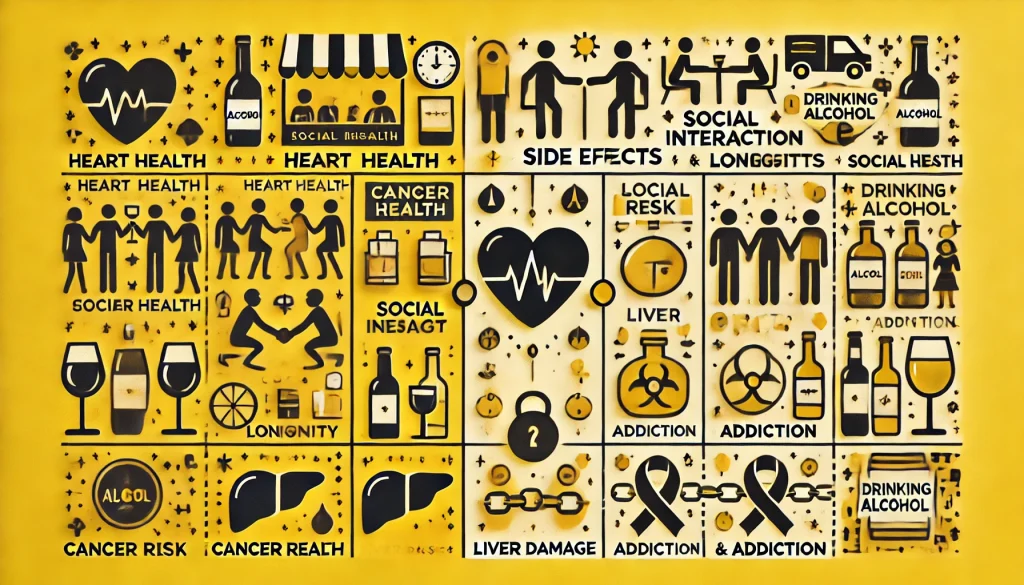The Benefits and Side Effects of Drinking Alcohol: What You Need to Know

Introduction
Alcohol has been a part of human culture for thousands of years. From ancient celebrations to modern social gatherings, it plays a significant role in our lives. However, while some people enjoy its potential benefits, it’s important to be aware of the side effects it can have on health. This article will explore both the benefits and side effects, providing a balanced view to help you make informed decisions.
Table of Contents
Benefits of Drinking Alcohol
- Cardiovascular Health Moderate-alcohol consumption, particularly red wine, has been linked to a lower risk of heart disease. This is largely attributed to the presence of antioxidants like resveratrol, which can help reduce inflammation and increase levels of good cholesterol (HDL). According to a study published in the American Journal of Clinical Nutrition, moderate drinkers have a 25-40% lower risk of heart disease compared to non-drinkers .
- Longevity Some research suggests that moderate consumption may contribute to a longer life. A study published in Alcoholism: Clinical and Experimental Research found that moderate drinkers had a lower risk of mortality than heavy drinkers and abstainers . However, it’s important to note that this doesn’t mean more is better, as excessive drinking can lead to numerous health problems.
- Improved Social Interaction Drinking can act as a social lubricant, reducing inhibitions and making social interactions smoother. This can be particularly beneficial in social situations where anxiety or shyness might otherwise hinder communication. The sense of relaxation and euphoria can enhance social bonding and create a positive atmosphere.
- Reduced Risk of Type 2 Diabetes Moderate drinking consumption has been associated with a reduced risk of developing type 2 diabetes. This may be due to alcohol’s ability to improve insulin sensitivity. A study published in Diabetes Care found that moderate alcohol consumption was linked to a 30% reduced risk of type 2 diabetes in women .
- Enhanced Cognitive Function Some studies suggest that moderate consumption may have cognitive benefits, particularly in older adults. Research published in the journal Neuropsychiatric Disease and Treatment indicates that moderate drinkers may experience a slower decline in cognitive function compared to non-drinkers . This could be due to the cardiovascular benefits of alcohol, which also promote brain health.
Side Effects of Drinking Alcohol
- Increased Risk of Cancer consumption has been linked to an increased risk of several types of cancer, including breast, liver, mouth, throat, and esophageal cancer. The risk is higher for heavy drinkers, but even moderate consumption can elevate the risk. According to a study in The Lancet Oncology, drinking can damage DNA and interfere with the body’s ability to absorb nutrients that protect against cancer, such as folate .
- Liver Damage The liver is responsible for metabolizing alcohol, and excessive drinking can lead to liver damage. Conditions like fatty liver, hepatitis, and cirrhosis are common among heavy drinkers. Over time, the liver becomes less efficient at processing, leading to a buildup of toxins that can cause inflammation and scarring. A study in Gastroenterology highlights the significant impact on liver health, emphasizing the risk of chronic liver disease .
- Addiction and Dependency drinking is a highly addictive substance. Regular consumption can lead to tolerance, where the body requires more to achieve the same effects. This can quickly escalate into dependency, where the individual feels unable to function without drinking. Alcohol addiction can have severe consequences on both physical and mental health, leading to issues like depression, anxiety, and withdrawal symptoms. Research in the Journal of Substance Abuse Treatment shows that dependency is a major public health concern, with significant implications for individual and societal well-being .
- Mental Health Issues While drinking can initially have a relaxing effect, excessive consumption is linked to a range of mental health problems. drinking can exacerbate conditions like depression and anxiety and may even lead to the development of new mental health issues. Long-term alcohol use can alter brain chemistry, leading to mood swings, irritability, and cognitive impairments. A study in The Lancet Psychiatry found a strong association between alcohol use and mental health disorders, emphasizing the need for moderation .
- Impaired Judgment and Coordination drinking impairs cognitive functions such as decision-making, judgment, and coordination. This can lead to risky behaviors like drunk driving, which is a major cause of accidents and fatalities. Even small amounts of drinking can affect reaction times and the ability to make sound decisions, increasing the likelihood of injuries and accidents. The National Institute on Alcohol Abuse and Alcoholism reports that alcohol-related accidents are a leading cause of injury and death worldwide .
- Weight Gain and Nutritional Deficiencies drinking is high in empty calories, meaning it provides little nutritional value while contributing to weight gain. Additionally, drinking can interfere with the body’s ability to absorb essential nutrients, leading to deficiencies in vitamins like B12 and folate. Chronic consumption can also affect appetite and disrupt normal eating patterns, further contributing to poor nutrition and weight gain. A study published in Obesity Reviews discusses the impact on weight management and nutritional health .
Moderation is Key
The key to enjoying the benefits of drinking while minimizing its risks lies in moderation. For most people, moderate drinking is defined as up to one drink per day for women and up to two drinks per day for men. However, this can vary depending on individual factors such as age, weight, and overall health.
It’s also important to choose your drinks wisely. Opting for beverages with lower content, such as wine or beer, can help reduce the risk of overconsumption. Additionally, drinking plenty of water and eating a balanced meal before consuming can help slow the absorption into the bloodstream, reducing its impact on the body.
Conclusion
Consumption can have both benefits and side effects, and it’s crucial to weigh these factors carefully. While moderate drinking may offer some health benefits, excessive use can lead to serious health problems. Understanding the potential risks and practicing moderation can help you enjoy responsibly, enhancing your social life and potentially contributing to your overall well-being.
Remember, if you have any concerns about your alcohol consumption or its effects on your health, it’s always best to consult with a healthcare professional. They can provide personalized advice and support to help you make the best choices for your health.
References
- American Journal of Clinical Nutrition, “Moderate Alcohol Consumption and Heart Disease.”
- Alcoholism: Clinical and Experimental Research, “Moderate Drinking and Longevity.”
- Diabetes Care, “Alcohol Consumption and Type 2 Diabetes Risk.”
- Neuropsychiatric Disease and Treatment, “Cognitive Benefits of Moderate Alcohol Consumption.”
- The Lancet Oncology, “Alcohol Consumption and Cancer Risk.”


